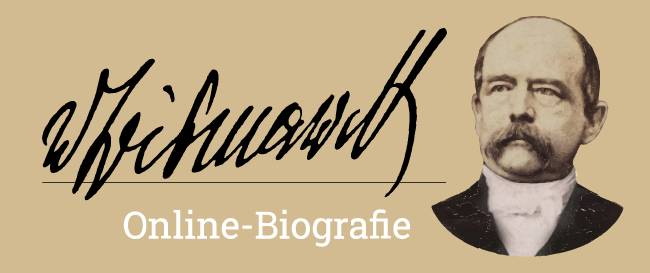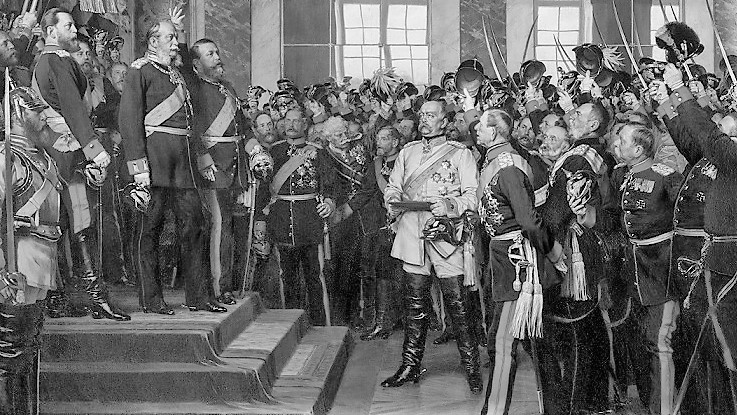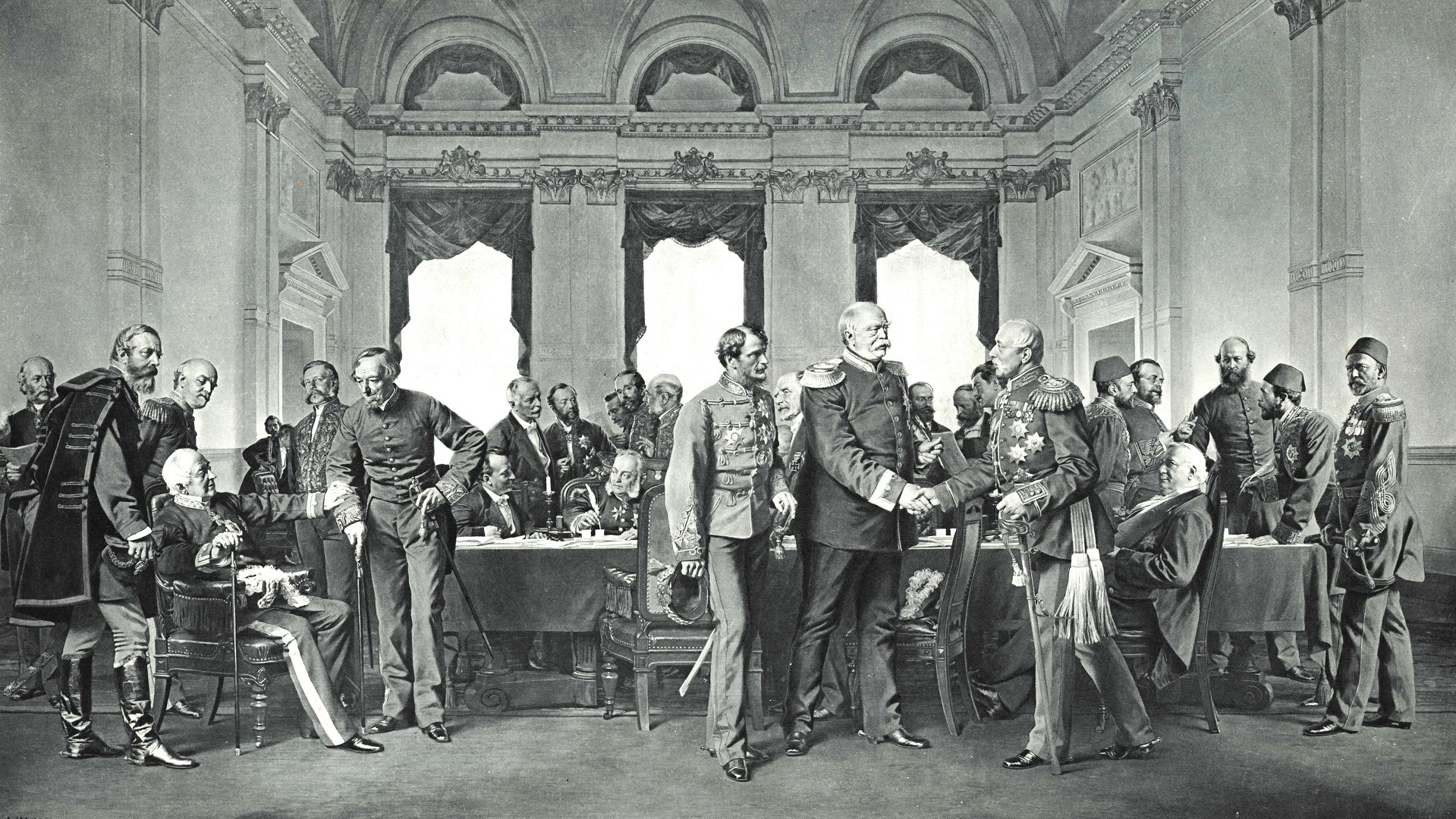Letter to the bride Johanna von Puttkamer, Schönhausen, February 7, 1847
My heart
Having just returned through a wild snowstorm from an appointment (which was unfortunately caused by the fire damage to a poor family), I warmed myself to your dear letter; in the semi-darkness I already recognized your "highborn". I tremble in all my limbs to fly to Berlin today and apply the unspeakable phrase of the Poberow [Puttkamer-Poberow] to the dykes and the waters. The relentless thermometer shows 1 under 0, accompanied by howling wind and coarse flakes, as if it's about to rain. What is duty? compare Falstaff's sayings about honor. At least I want to write to you, should I also ruin myself in Porto and should no sensible thoughts find their way through the fire debris that still dominates my imagination.
After reading your last word, I just lit my cigar and stirred the ink. First like a businessman to answer your letter. I'll start this off with a request that tastes of the file table. That you specifically mention in your letter, if you like it that way, which letters you have received from me according to the date; Otherwise one is in uncertainty about the right concern, just as I am doubtful whether you have received my first letter, which I received on a business trip on the day of my arrival here, in Jerichow, if I am not mistaken, wrote on very bad paper, Friday January 29th. Thank you very much for not writing in the evening, my dear, even if I am to suffer from it myself; every future look into your gray-blue-black eye with the large pupil will make up for any late or shortened letters. –
If only I could dream of you, if you of me; but I haven't dreamed at all for a while; dreadfully sane and prosaic; or whether my soul flies to Reinfeld at night and communicates with yours? Then she can't dream here, of course; but she would have to tell about her journey in the morning; the grumpy thing is silent about her nocturnal occupations, as if she slept along like a badger. –
Your memory of the tormentor Fritz with the mail bag puts me right in Reinfeld and awakens my longing even more vividly for the time when I can again hug my black Jeannette to say good morning at my desk. I would like to tell you a romantic story about the letter with the fabulous address, obviously from a lady's hand; but must destroy every illusion with the explanation that it comes from a worn-out friend who, if I'm not mistaken, once copied an Italian address in Kniephof that I received. Again a coulisse behind which one suspects all the poetry in the world and finds the dullest prose. (Once in Aachen, on a walk around the stage, I saw the Princess of Eboli, after I had just felt contrite on the scene and felt sorry for her at the feet of the Queen, behind her eating a butter sandwich and making bad jokes.) That me cousin Woedtke loves and the Versin sausage and letter thing is in order, makes me happy. –
I need not protest that I take a heartfelt part in the suffering of my good mother; I hope the rest and summer will have a healing effect on her, and later she will recover in the joy of seeing her children happy. When she is here, she should not have to climb any stairs to come to you and should live right next to you. –
Why are you sad, black in dress and heart, my angel? take care of the green of hope, which rustled in me quite joyfully today when I saw its outward image when the gardener placed the first heralds of spring, hyacinths and crocuses, on my window; et dis-moi donc, pourquoi es-tu paresseuse? pourquoi ne fais-tu pas de musique? I thought you played C major when the hollow dew howls through the dry branches of the linden trees, and D minor when the snowflakes whirl in a fantastic whirl around the corners of the old tower and, after raging despair, cover the graves with their shrouds. Oh, if I were Keudell, I'd play all day now, and sounds would carry me over Oder, Rega, Persante, Wipper - I don't know where.
Speaking of paresse, I would like to ask you one more thing, but with a foreword. If I ask you for something, I say (don't take it as a slander or a mockery): Your will be done, namely yours, and love you no less and I will not be angry with you for a second if you do not comply with my request; I love you as you are and as you think it is good to be. After I have sent this out of innermost unvarnished truth, without "hype and fluff", I ask you to occupy yourself a little with French, not much, but by reading French things that interest you and getting clear with the dictionaire do what is not clear to you; if it bores you, leave it alone; but try it with books that interest you, whatever it may be, novels or whatever. I don't know what mother thinks about such reading, in my opinion there is nothing that you, for yourself, cannot read. I do not ask this for my own sake, because we want to understand each other in our mother tongue; but in contact with the world you will not infrequently come across cases where you find it uncomfortable, even offensive, if French is foreign to you; I don't know to what degree this is the case, but reading is a way to preserve what you have and to memorize more; If you like it, we'll find ways to make it easier for you to speak than you say it is. If you don't like it, stick to the preamble to my request with full confidence. –
I wrote to poor Moritz yesterday, and with your description of his sadness my letter is like a stone in my conscience; like a heartless egoist I mocked his pain with the description of my satisfaction and in 5 pages I didn't think a syllable of his sorrow, only talked about myself and again and again and used him as a father confessor; one is an inept comforter if one does not feel the pain oneself, or no longer feels it vividly enough. My first pain was the passionate, selfish one of the loss I suffered; I do not feel it about Marie [for] her sake, for I know she is in good hands, but that my compassion for the suffering of my warmest friend, to whom I owe eternal gratitude, is not powerful enough, a word of consolation, strong consolation from overflowing feeling, that pushes me hard. Do not weep, my angel, let your sympathy be strong and full of trust in God, comfort him really with freshness, not with tears, and double if you can, for yourself and for your ungrateful friend, whose heart is full of you for now and has no room for Andres. Are you a withered leaf, a washed-out dress? I want to see if my love can cultivate the green again, freshen up the colors. You must put forth fresh leaves, and I want to put the old ones between the book of my heart so that we can find them as we read as a sign of dear remembrance. You have rekindled the embers that glowed within me beneath ashes and debris, let them envelop you in invigorating flames. –
Le souper is servi, the evening is over and I have done nothing but chatted and smoked with you; is that a proper occupation for Herr Deichhauptmann? Why not. I have in front of me …..'s mysterious letter; he writes in a key that is new to him, pretends that he sees that he has done his first wife many an injustice, that he has not always managed and carried her weakness properly, that the "child" was no support, and believes to be purified by this severe punishment. Qu'est ce qu'il me chante? Did the letter undergo a transformation in Reinfeld's Christian climate, or did it come from the hand of this otherwise superficial fop? Incidentally, he claims to live with his present wife, whom he met 8 days before the engagement and married 6 weeks after it, in unprecedented happiness, which he learned to appreciate through his first marriage. Do you know the story of the French roofer who fell and exclaimed as he passed the 2nd floor: Ça va bien, pourvu que ça dure! think only when we meet on October 12, 44 [day of the marriage of Moritz and Marie von Blanckenburg] engaged and married on November 23. What concern for Mama. –
The wretched English poems no longer bother me, it used to be when I looked cold and rigid into nothingness, snow flurries in my heart. Now a black cat is playing with it in the sunshine as with a rolling ball of yarn, and I like to see its rolling; At the end I want to give you a few more verses from that time, fragmentary copies of which, as I can see, have been preserved in my writing case. You can always allow me to read them, they no longer harm me. Thine eyes still have (and will always have) a charm for me. Write me the wedding plans in question in the next letter; I believe, by Jove, the thing will Ernst with us; until the day is determined it still seems to me as if we were dreaming; or was I really in Reinfeld for 14 days and held you in my arms? Has Finette [Johanna's mother's favorite dog] been found?
Do you remember our conversations when we went out with her in the paddock, where you little rascal said you would have let me go basket-loaded if God had not taken pity on me and at least let me see through the keyhole of his mercy door? That came to mind when I read 1 Corinth yesterday. 7.13 and 14 read. An explanation for this: the Christian should regard the kingdom of God as the more powerful, victorious one in the end overcoming all resistance in all circumstances of life, that of darkness as powerless and collapsing more and more. How often you have so little trust in your faith and wrap it so carefully in the cotton of seclusion, so that no breeze in the world can get it cold, but others get angry at you and cry out for people who think themselves too holy to believe in to be touched by tax collectors etc. If everyone who thinks they have found the truth thought like that, and many ernste sincere, humble seekers believe to find it somewhere else or in another form, what a Pensilvan cell prison would God's earth become, divided into 1000 and 1000 exclusive coteries by insurmountable partitions. Compare Rom. 14. 22 and 15. 2, especially also 1 Cor. 4.5; 8.2; 9.20 also Cap. 12. V. 4 and following, also 13.2., everything in the 1st to Corinth, which seems to me to belong in the topic.
We also talked a lot about “work sanctity” on that walk or another; I don't want to inundate you with Scriptures in this regard, I just want to tell you how wonderful I think the Epistle of Jacobi is. (Matth. 25 v. 34 and following, Rom. 2nd 6th, 2nd Cor. 5th 10th, Rom. 2nd 13th, 1st Ep. Joh. 3rd v. 7., innumerable others). To be sure, it is fruitless to argue with fragmented sentences of Scripture out of context; but there are many who sincerely strive and put more weight on passages like Jacobi 2. V. 14 than on Ev. Marc. 16. 16 and for the last place give interpretations and hold them to be correct, which literally will not agree with yours. Of what interpretation is not the word faith capable of itself and in relation to what Scripture commands to be believed in each and every instance where the word is used. I get into spiritual discussions and disputes against my will. Among Catholics, the Bible is either not read at all by laypeople, or read with great caution, only interpreted by clergymen who have devoted their lives to studying the sources. In the end it all comes down to interpretation. – Concert in Bütow amuses me; Bütow's idea is the opposite of all music to me. –
I've been pretty talkative, haven't I? now I have to stir up a bit of filing dust and sharpen my pen again to the official police style for the district administrator and the government. If only I could seal myself in or go along as a piece of mail in a salmon basket. Good-bye, dearest black one. Je t'aime c'est tout dire.
Bismarck
(I forget the English verses :)
Sad dreams, as when the spirit of our youth
Returns in sleep, sparkling with all the truth
And innocence, once ours, and leads us back
In mournful mockery over the shining track
Of our young life, and points out every ray
Of hope and peace, we've lost upon the way!
I believe by Moore, perhaps Byron.
To morrow, and to morrow, and to morrow
Creeps in this petty pace from day to day,
To the last syllable of recorded time,
And all our yesterdays have lighted fools
The way to dusty death. Out, out, letter candle!
Life's but a walking shadow, a poor player,
That struts and frets his hour upon the stage
And then no more is heard; it is a tale
Told by an idiot, full of sound and fury
Signifying nothing
Warm greetings to the parents and the Reddentine [Below-Reddentine].




